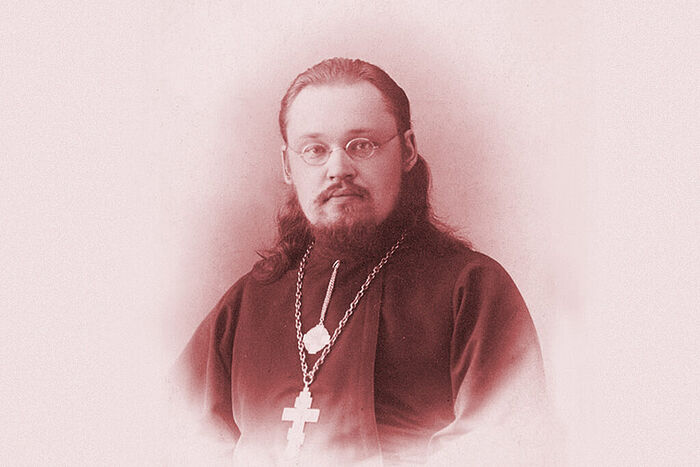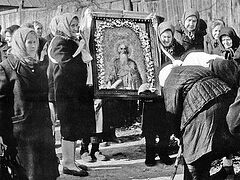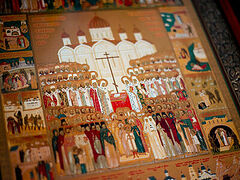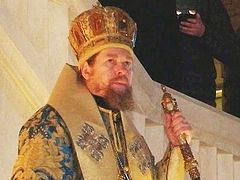Fr. Ilya Chetverukhin called the Vishersky concentration camp his ultimate “theological academy,” and without it, “he wouldn’t enter the Kingdom of Heaven.” That’s where, in the midst of inhumane suffering, he found peace in his soul and profound gratitude to God
They met at a ball arranged by the cadet corps in January of 1905. While her sisters were dancing away enthusiastically, Eugenia Grandmaison and Ilya Chetverukhin were sitting in the corner talking as if they were old friends. The subject of their conversation was spiritual writings. Upon his return home after the ball, Ilya immediately took to studying the works of St. Theophan the Recluse—his new acquaintance knew and loved them, but he had only heard a few things about them in passing...
Life as if in a book
Before meeting his future bride, Ilya was a student who simply believed in God (which in itself was a rarity at that time). When he saw Zhenya’s [diminutive of Eugenia] profound knowledge of the Gospel, he took to studying the New Testament, read the holy fathers, and kept strict fasts. In the end, he made up his mind to quit his studies at the university and enroll in the Theological Academy.
They corresponded for three years before their wedding (their father confessor, Elder Alexei of Zosimov Hermitage, blessed them to write no more than once a month and meet in person only twice a month). Their letters have been preserved. The two wrote to one another about prayer, struggle with the passions, and worship. Their relatives thought their relationship was improper: “Every time you see them, all you hear is talk is about spiritual things,” Eugenia’s sister Maria would complain. “A life like yours is so unnatural; you force yourself to live it like it’s written in books.” But Ilya and Zhenya were even glad that they didn’t find favor in the eyes of others. “I answered that such life is exactly the source of true happiness for us... We have long decided it was better to please God alone than all people,” Eugenia objected.
They did talk about their love as well, but they didn’t see it as their everything. “Zhenya dearest, the love we share is just a tiny speck that flickers out in the presence of the Kingdom of Heaven… Yes, my dear Zhenya, I am to you and you to are me the secondary, so to speak, and not principal thing. Let’s not forget that. Our aim is to be with Jesus Christ.”
A Monastery in the middle of the world
 Fr. Ilya in the St. Nicholas Church in Tolmachy
Fr. Ilya in the St. Nicholas Church in Tolmachy
In 1907, Ilya Chetverukhin entered the Moscow Theological Academy and the young couple were married the following year. In the first days of their married life, they went on a pilgrimage to fast and pray at Zosimov Hermitage, where their father confessor Elder Alexiy lived. As Eugenia recalled, their honeymoon resembled the first few days of a monastic tonsure—they spent so much time in prayer. Fr. Alexiy blessed the young couple, saying, “I wish for you neither wealth, nor fame, nor success, and not even health, but that you have peace of mind. This is the most important thing. If you have peace, you will find happiness.”
Upon their return from their honeymoon, they invited their seminarian friends to hold a prayer service and bless their house. Among those who came then were Hieromonk Nicholas (Mogilevsky), Nicholas Zvezdinsky, Alexander Tuberovsky, Sergei Sadkovsky, and Sergei Goloshchapov—all of whom would soon become confessors of the faith and glorified among the saints.
After that celebration, the young family basically withdrew into seclusion. With the blessing of their elder, they received guests once a year; besides, they lived quite poorly. Matushka Eugenia recalled that “we couldn’t afford to buy sweets for over two years after our wedding.”
In 1911, Ilya was ordained a priest, graduated from the Theological Academy and defended his thesis on the works of St. Isaac the Syrian. His family, now with two children, moved to Moscow to his first place of ministry in the Yermakov almshouse in Sokolniki.
Ermakov–style training
At that time, about four hundred and fifty women lived in the almshouse founded by the manufacturer Frol Yermakov “for the care of elderly and crippled peasants.” In her memoirs, Matushka Evgenia would write that “the Lord humbled his [her husband’s] impulses at almost every step—the service at church wasn’t served reverently enough, the choir sang hurriedly, or it even interrupted his dismissals and prayers. The almshouse residents weren’t particularly eager to lead the spiritual life either, and instead of being present at the church service they either drank tea in their rooms or knitted, while others quarreled with their neighbors.
There were three kinds of rooms in the almshouse: one for healthy elderly women, another for the ambulatory disabled, and a third for the disabled (or bedridden). The living conditions were hard for the latter, and so those old cripples would often get bored with their lives and resort to grumbling. Fr. Ilya comforted them by saying that there are no unwanted or unnecessary people, that they can please God by being patient, enduring weakness, and praying for themselves and all mankind.
Tolmachy
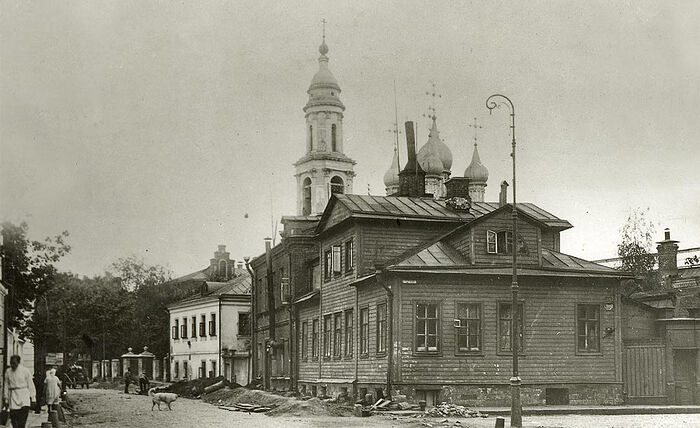 View of the St. Nicholas Church in Tolmachy in the 1920s
View of the St. Nicholas Church in Tolmachy in the 1920s
In 1919, a vacancy opened for the position of church rector in the St. Nicholas Church in Tolmachy. The Yermakov almshouse had been closed by then. Besides, Fr. Ilya felt a spiritual connection with that church, as his father-confessor had served there for twenty-eight years as a deacon.
At the time, the parish council was choosing a new church rector. Each of several candidates had to serve the Liturgy and preach a sermon. Fr. Ilya was elected unanimously.
Truth be told, the church was struggling at the time. Its deacon and chanter quit, and there was no choir. There was also no firewood, candles, or even oil for lamps. “During the first winter there, the church would glisten with frost on the inside. Practically no one attended the services,” recalled Sergei, Fr. Ilya’s eldest son. But Fr. Ilya kept serving every day. Matushka sang and read, while their sons helped in the altar.
At a time when they endured such misery, Fr. Ilya was building up his ideal church lifestyle—an atmosphere of reverence, abiding by the typikon, and voluminous sermons. The readings were done in an unhurried, clear, and vociferous manner.
People seeking spiritual life flocked to Tolmachy. Confessions at church following the service could last until midnight. Fr. Ilya confessed with great attention. “One couldn’t say simply, ‘I sinned by judging. He demanded that you say when, where and who you judged,” recalled Vera Borodich, a spiritual daughter of Fr. Ilya since her teens. Batiushka in those years was often strict, trying to “humble” his spiritual flock, and so he punished them with a measure of disregard for human weakness and coldness. Later, when he was in the camp, he used to say that if he were to return to his ministry he would be more forgiving and gentle with people.
Some of his parishioners in Tolmachy at that time were Nikolai Rein, a botanist, who was executed in 1938 and canonized in 2000; the poet Alexander Solodovnikov, a confessor of faith who spent twenty years in camps and exile; Vera Borodich, a linguist and future professor of the Moscow State University and the Moscow Theological Academy; and Princess Raisa Adamovna Kudasheva, who was the author of the song, “A Christmas tree born in the woods”1 and of a poem on the closing of the church in 1929, and sang in the church choir.
“Accustomed to any menial labor”
 Holy Hieromartyr Ilya (Chetverukhin) at the Vishersky concentration camp, 1932.
Holy Hieromartyr Ilya (Chetverukhin) at the Vishersky concentration camp, 1932.
The day arrived when Fr. Ilya was arrested. He and Matushka expected it to happen soon, so they knew what to do. She quickly gathered his things, trimmed the tips of batiushka’s hair, and said a prayer. Fr. Ilya was led away. The overcrowded cell of the Butyrka Prison had so little room left that the priest had to spend the night lying on the floor underneath the bunk beds. Later, during a family visit in the camp, he tearfully recalled how he’d lay on a floor that was spattered with spittle thinking—what if his spiritual children were to see him right now.
Chetverukhin was sentenced to three years in the Vishersky camps. During his incarceration he worked as a shoveller, an unskilled construction laborer, and a hospital clerk. As a priest who was formerly unaccustomed to manual work, he had to dig the frozen ground in forty-degrees-below zero (centigrade) weather, when even a crowbar couldn’t break it; he also sawed logs and shoveled sawdust. One day he got so tired that he fell down, unable to get up. He ended up in the hospital, where he was able to restore his strength to some extent. But immediately following his illness, he was made to walk all day long for a distance of fifty-four kilometers, in the winter, deep in the snow, having been sent on “an assignment” to cut timber.
One day, Fr. Ilya’s backbreaking work drove him to despair. It seemed as if God had forsaken and abandoned him. Deep in sorrow, he prayed, then lay down and wept bitterly. He felt better the next day, as he regained his faith and determination to accept it all. And then a miracle happened: He was called to the office and transferred to lighter work.
On Christmas Day, his cellmates started an antireligious dispute. Fr. Ilya was unable to put down his opponents as brilliantly as is sometimes described in books. He was lying on the top bunk, pulling his blanket over his head, in the futile hope of silencing the mockery of faith.
The Chetverukhins mention Fr. Ilya’s library collection many times in their memoirs. He gathered it throughout his life, and it consisted of more than ten thousand volumes. He loved books passionately, as his son Sergey recalled, but he loved even more to give them away. He would buy books with his last money, when there was nothing left to eat at home. Without telling his matushka, he’d share the joy of his new find with his parishioners. The library was the most precious worldly thing for him. How his family members feared telling Fr. Ilya that his library was no longer there, confiscated and taken away God knows where.
But when the priest learned of it his only concern was his matushka and how she endured it. In a conversation with his son during a visit in the camp, Batiushka said, “It seems to me right now that my love of books kept me from loving you as much as you deserve, my dearest.”
His correspondence from the camp is full of concern for his matushka, his “new Job,” as he called his wife in one letter. While he was imprisoned, she buried her mother and their five-year-old daughter Mashenka.
“If I am ever able to return to you, I will try hard to help you in every possible way. I have now learned how to clean, cook meals, heat the stove, and chop firewood... in a word, I am accustomed to all kinds of menial work,” writes Fr. Ilya in a letter to his matushka, Evgenia.
I know for certain that in eternal life, you and I will be together. But here on earth—we won’t”
 “Tolmachyites,” with N. A. Rein in the center of the upper row marked with a cross, 1932.
“Tolmachyites,” with N. A. Rein in the center of the upper row marked with a cross, 1932.
In June of 1932, Matushka was able to visit her husband in the camp. For six evenings they were able to see each other a for few hours at a time. Batiushka spoke at length about his life, and once they parted, Eugenia Nikolayevna would immediately write down everything she has just heard.
“Your letters are often an exercise in futility: you count the days that passed since we parted and how many more remain until the day I come home. I don’t expect that to happen. I am certain that we will be together in eternity, but not here on earth. I will most likely get three more years. This is where I am studying at yet another spiritual academy; and without it I would not be allowed in the Kingdom of Heaven. I expect death at any day and prepare to meet it.”
Such a disposition did not come all at once. He went through crushing despondency, emotional numbness, and grumbling. A particular peace settled in Fr. Ilya’s mind after his imprisonment in the disciplinary cell in January of 1932. He was arrested based on a false accusation and locked in an unheated, rat-infested cell. He spent twenty days there lying on the floor, without hot food, given only black bread to eat. He said that it was there that he finally accepted his fate and left the disciplinary ward a transformed man.
Sergei Alekseevich Nikitin, a close friend and a doctor at the camp hospital, who later became a monk and a bishop, spoke of his last conversation with Fr. Ilya on the eve of his death. The priest said: “I have acquired peace of mind here, and if I am ever able to bring even the tiniest part of that peace with me back to Moscow, I will be the happiest man on earth.”
“I have lost many things in this life, and I am not afraid of losing anything; I am ready to die anytime. I love the Lord, and I am willing to be burned alive at the stake for Him.” The next day, on Sunday of December 18, 1932, Fr. Ilya died in a fire at the camp club.
His family didn’t learn of his death right away. Only on February 12, 1933, were they able to serve a funeral in his memory. Matushka Eugenia remembered that on that same day, also a Saturday but twenty-eight years ago, nineteen-year-old Ilya Nikolaevich Chetverukhin visited her parents’ home for the first time.
Matushka, “righteous among righteous women” herself, as her husband called her, lived until 1973, becoming a source of support and comfort not only to her own children but also to the parishioners in Tolmachy, as well as new generations of Orthodox Christians. She never felt separated from her husband, but in her words, lived as if she went on sharing her life with him. Just as they dreamed at the very beginning, as Ilya wrote to his bride: “For His sake, our two souls are becoming as one... But beyond the grave, our souls will be one, we will never be separated again, and together we will sing glory to God.”
Source: Glory to God for All Things. The Life of Hieromartyr Ilya Chetverukhin. History of his family, according to the recollections of his relatives and spiritual children. Sermons. Letters. (Compiled by Olga Sergeevna Chetverukhina.)

